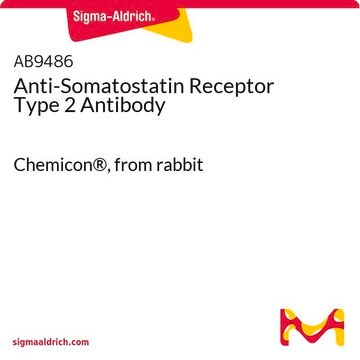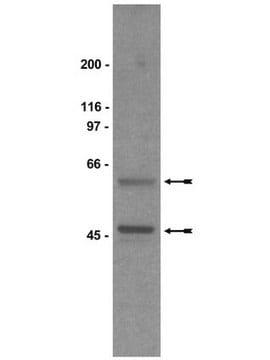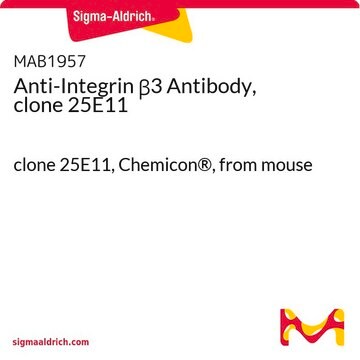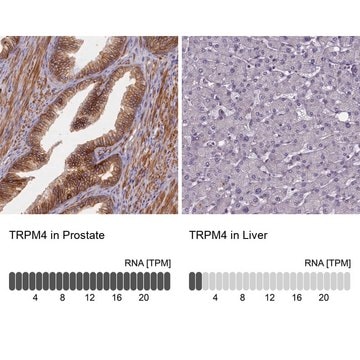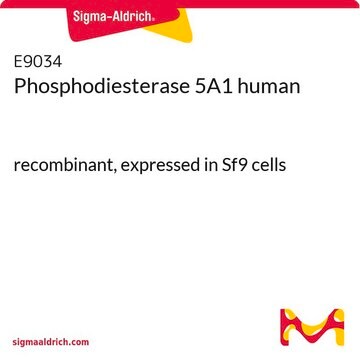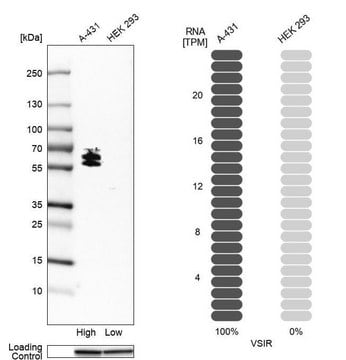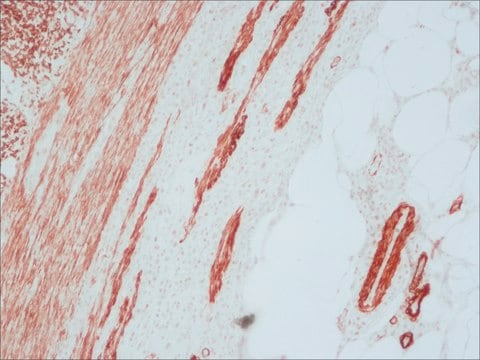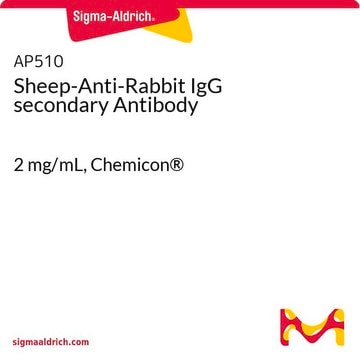MAB5220
Anti-NMDAR2B Antibody, clone 13A11
clone 13A11, Chemicon®, from mouse
Sinônimo(s):
NR2B
Faça loginpara ver os preços organizacionais e de contrato
About This Item
Código UNSPSC:
12352203
eCl@ss:
32160702
NACRES:
NA.41
Produtos recomendados
fonte biológica
mouse
Nível de qualidade
forma do anticorpo
affinity purified immunoglobulin
clone
13A11, monoclonal
reatividade de espécies
human
fabricante/nome comercial
Chemicon®
técnica(s)
immunocytochemistry: suitable
immunohistochemistry: suitable
western blot: suitable
Isotipo
IgG1
nº de adesão NCBI
nº de adesão UniProt
Condições de expedição
dry ice
modificação pós-traducional do alvo
unmodified
Especificidade
NMDAR2B
Imunogênio
Amino acid region 1033-1161 from human NMDAR2B produced as a GST fusion protein.
Aplicação
Anti-NMDAR2B Antibody, clone 13A11 is an antibody against NMDAR2B for use in IC, IH & WB.
Immunohistochemistry (light and EM) on 4% paraformaldehyde & 0.125% glutaraldehyde fixed tissue: 2.5-5 μg/mL.
Immunocytochemistry: 2.5-5.0 μg/mL
Western blot: 1-5 μg/mL Optimal working dilutions must be determined by end user.
Immunocytochemistry: 2.5-5.0 μg/mL
Western blot: 1-5 μg/mL Optimal working dilutions must be determined by end user.
Research Category
Neuroscience
Neuroscience
Research Sub Category
Neurotransmitters & Receptors
Neurotransmitters & Receptors
forma física
Affinity purified immunoglobulin. Liquid in PBS. Contains no preservative.
Format: Purified
Armazenamento e estabilidade
Maintain frozen at -20°C in undiluted aliquots for up to 12 months. Avoid repeated freeze/thaw cycles.
Outras notas
Concentration: Please refer to the Certificate of Analysis for the lot-specific concentration.
Informações legais
CHEMICON is a registered trademark of Merck KGaA, Darmstadt, Germany
Exoneração de responsabilidade
Unless otherwise stated in our catalog or other company documentation accompanying the product(s), our products are intended for research use only and are not to be used for any other purpose, which includes but is not limited to, unauthorized commercial uses, in vitro diagnostic uses, ex vivo or in vivo therapeutic uses or any type of consumption or application to humans or animals.
Código de classe de armazenamento
12 - Non Combustible Liquids
Classe de risco de água (WGK)
WGK 2
Ponto de fulgor (°F)
Not applicable
Ponto de fulgor (°C)
Not applicable
Certificados de análise (COA)
Busque Certificados de análise (COA) digitando o Número do Lote do produto. Os números de lote e remessa podem ser encontrados no rótulo de um produto após a palavra “Lot” ou “Batch”.
Já possui este produto?
Encontre a documentação dos produtos que você adquiriu recentemente na biblioteca de documentos.
Elisa A Waxman et al.
The Journal of biological chemistry, 282(24), 17594-17607 (2007-04-27)
The neuronal transporter excitatory amino acid carrier 1 (EAAC1) is enriched in perisynaptic regions, where it may regulate synaptic spillover of glutamate. In this study we examined potential interactions between EAAC1 and ionotropic glutamate receptors. N-Methyl-D-aspartate (NMDA) receptor subunits NR1
Alexandre A Hoeller et al.
PloS one, 11(1), e0147293-e0147293 (2016-01-23)
Extensive evidence indicates the influence of the cholinergic system on emotional processing. Previous findings provided new insights into the underlying mechanisms of long-term anxiety, showing that rats injected with a single systemic dose of pilocarpine--a muscarinic receptor (mAChR) agonist--displayed persistent
The N-methyl-D-aspartate receptor type 2A is frequently methylated in human colorectal carcinoma and suppresses cell growth.
Kim, MS; Chang, X; Nagpal, JK; Yamashita, K; Baek, JH; Dasgupta, S; Wu, G; Osada, M; Woo et al.
Oncogene null
Katherine Leaderbrand et al.
Neurobiology of learning and memory, 113, 35-40 (2013-09-24)
Unpredictable stress is known to profoundly enhance susceptibility to fear and anxiety while reducing the ability to extinguish fear when threat is no longer present. Accordingly, partial aversive reinforcement, via random exposure to footshocks, induces fear that is resistant to
Sylvie L Lesuis et al.
Neuropharmacology, 149, 195-203 (2019-01-15)
Programming of the brain by early life stress has been associated with alterations in structure and function of the dorsal hippocampus. Yet, the underlying molecular mechanisms remain largely elusive. In this study, we examined the effects of early life stress
Nossa equipe de cientistas tem experiência em todas as áreas de pesquisa, incluindo Life Sciences, ciência de materiais, síntese química, cromatografia, química analítica e muitas outras.
Entre em contato com a assistência técnica